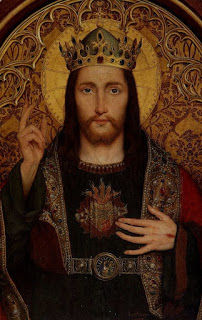Thy Kingdom Come
 The most familiar Catholic prayer that we’ve been taught from young is the Pater Noster, the very prayer our Lord taught His disciples. Right after addressing God as Father and affirming the holiness of His name, we make this petition: “Thy kingdom come, thy will be done, on earth as it is in heaven” (Matt 6:10). I strongly believe that few truly understand the intent and gravity of this simple petition. It pleads with God to act, to enter into our circumstances and to bring about His reign. It hopes for the day when God would end war, bring good news to the poor, bind the brokenhearted, proclaim liberty to captives, bring justice to the oppressed, comfort the mourning, create a new heaven and a new earth, and gather all the nations to worship Him.
The most familiar Catholic prayer that we’ve been taught from young is the Pater Noster, the very prayer our Lord taught His disciples. Right after addressing God as Father and affirming the holiness of His name, we make this petition: “Thy kingdom come, thy will be done, on earth as it is in heaven” (Matt 6:10). I strongly believe that few truly understand the intent and gravity of this simple petition. It pleads with God to act, to enter into our circumstances and to bring about His reign. It hopes for the day when God would end war, bring good news to the poor, bind the brokenhearted, proclaim liberty to captives, bring justice to the oppressed, comfort the mourning, create a new heaven and a new earth, and gather all the nations to worship Him.
But the Lord’s Prayer guides us through a world where ideal seems different from reality, where heaven and earth can seem really far apart. Wars are still fought. The poor still experience injustice. The broken-hearted still suffer. People are still captive to sin, death, the devil. We live in a world that either sees no need for God or is callously indifferent to His existence. But, despite our everyday experiences, the Church continues to proclaim as she did from the very beginning until the very end of time, that our Lord is King. She continues to proclaim confidently that our Lord Jesus Christ reigns, and because He reigns as King of the Universe, death is a defeated foe, sin is being subdued, the hearts of the broken-hearted are being bound up, the poor are hearing the good news, justice is coming to the oppressed, communities and individuals who mourn are being comforted, the new heavens and new earth are being re-created. Of course, in the midst of gloom, it is hard to perceive any of this. Is God’s Kingdom still an unfulfilled and distant dream? Well, today’s gospel reminds us that His Kingdom is not of this world and it can only be perceived by those who do not belong to this world.
The gospel gives us the encounter of our Lord with Pontius Pilate, the Roman Governor of Judaea. What an extraordinary scene! The representative of the world’s greatest empire at that time stands in judgement over the King of the Universe, the Supreme Judge of both the living and the dead, the One who will judge the world, and confer eternal life or death on each individual, including Pilate. The Jewish leaders had already questioned Jesus at a trial conducted in the darkness of night; a farce and travesty of justice, and apart from any real evidence, they found our Lord guilty of blasphemy and sentenced Him to death. The problem was that the Jewish leaders were not able to execute criminals found guilty in their courts because the death penalty was the sole prerogative of the Roman authorities. Thus, the Jewish leaders brought our Lord before Pilate for questioning, sentencing, and execution. There is, however, no onus on Pilate to interfere in religious questions, but because the accusation levelled against Jesus had to do with politics and public order, he begins his interrogation naturally by examining Him on the main charge: “Are you the King of the Jews?”
By replying with another question, Jesus is not refusing to answer Pilate: He wishes to make it quite clear, as He has always done, that His mission is a spiritual one. And really, Pilate’s was not an easy question to answer, because, it failed to fit into the categories of our Lord’s interrogators. To a Gentile, a king of the Jews meant, simply a rebel and political subverter of the Empire; whereas, to a Jewish nationalist, the King-Messiah was a politico-religious liberator who would obtain their freedom from Rome. They had that much in common. But the true character of Christ’s messiahship completely transcends both these categories.
Pilate then asked his second question, “What have you done?” Our Lord answered, “Mine is not a kingdom of this world; if my kingdom were of this world, my men would have fought to prevent my being surrendered to the Jews. But my kingdom is not of this kind.” After the miracle of the multiplication of the loaves in St John’s account, our Lord resisted the crowd’s insistence to proclaim Him king because the people were thinking in terms of an earthly kingdom. However, our Lord did enter Jerusalem in triumph, and He did accept the acclamation as Messiah, a Davidic title. Now, in the passion, He acknowledges before Pilate that He is truly a King, whilst making it clear that His kingship is beyond these earthly categories. Those who expected the Messiah to have visible temporal power were mistaken. ‘The kingdom of God does not mean food and drink but righteousness and peace and joy in the Holy Spirit’ (Rom 14:17). As the priest will pray in the Preface of today’s feast, His kingdom is “the kingdom of Truth and Life, the kingdom of Holiness and Grace, the Kingdom of Justice, Love and Peace.”
Then Pilate proceeded to ask Him the third and final question, “So you are a king then?” To which our Lord answered, “It is you who say it … Yes, I am a king. I was born for this, I came into the world for this: to bear witness to the truth; and all who are on the side of truth listen to my voice.” The word “truth” refers to something more than just the veracity of Jesus’ testimony. It is used 25 times in John’s Gospel to refer to divine revelation. Jesus Himself declares, “I am the truth”, because He is the revelation of the Father. Jesus bears witness to the truth that He is from God the Father, sent to serve and save mankind, by making God known in Jesus’ own person, by His words and actions and by gathering about Him those who freely respond. His greatest act of witness to the Truth is about to be fulfilled on the Cross. By His death and resurrection, our Lord shows that the accusations laid against Him were false: it was He who was telling the truth, not His judges and accusers, and God confirms the truth of Jesus–the truth of His words, of His deeds and of His revelation–by the singular miracle of His resurrection. To men, Christ’s kingship may seem paradoxical; in fact, it is the supreme paradox: He dies, yet He lives forever. He is defeated and is crucified, yet He is victorious.
Back to considering our disordered and dysfunctional world? Dare we hope that things will get better? I can’t be certain of this at this present moment or even in the near future, but I can safely say that we dare to pray. We continue to pray the Lord’s Prayer and plead with the Father, “Thy kingdom come, thy will be done, on earth as it is in heaven,” we are confident that our prayers have been answered and are being answered. You see the Kingdom which Christ established is not some ephemeral immaterial reality. It is not just an idea or an ideal to be realised in the future. The culmination of the Kingdom may lie ahead of us but it is even now present in our midst, as the Catechism of the Catholic Church reminds us, “it is brought near in the Word incarnate, it is proclaimed throughout the whole Gospel, and it has come in Christ’s death and Resurrection. The Kingdom of God has been coming since the Last Supper and, in the Eucharist, it is in our midst. The kingdom will come in glory when Christ hands it over to his Father.” (CCC 2816)
So, why does God continue to tolerate wicked people and their wickedness if indeed the Kingdom is upon us? Now, God delays judgment to give people time. Our Lord is not indifferent to our suffering nor is He late. On the contrary, He is patient, very patient. As St Peter writes, “The Lord is not slow to fulfill his promise as some count slowness, but is patient toward you, not wishing that any should perish, but that all should reach repentance” (2 Peter 3:9).But let us not take His patience for granted. At Christ’s return He will judge sin, death, the devil, and the people who choose to align themselves with evil. For now, we wait and hope. We recognise that we will not find a solution to all our troubles in our own human resources. We must look for the answer in the Kingdom of Christ. Here is our hope against all those experiences of death, suffering and evil. For this Christ was born, and for this Christ came into the world, to bear witness to the truth. Everyone who belongs to the truth listens to His voice.

